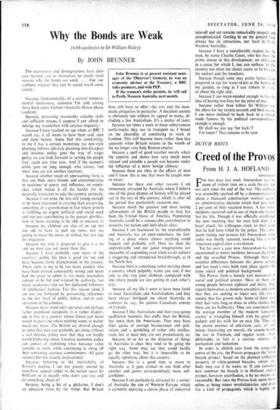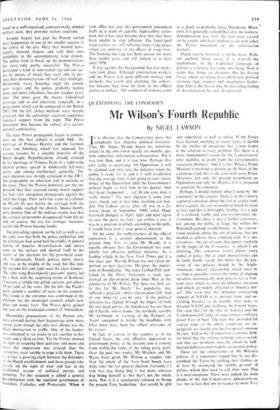DUTCH RIOTS
Creed of the Provos
From H. J. A. HOFLAND
AMSTERDAM
FOR two days last week Amsterdam vk a, the scene of violent riots on a scale the cit, had not seen since the end of the war. The outbreak was ostensibly sparked off by a demonstration of about a thousand construction workers against an administrative decision 'which had cost them 2 per cent of their vacation bonus. A few minor incidents occurred and in one of them one worker lost -his life. Though it was officially established the next morning that the man had died of a heart attack, his colleagues stuck to their claim that he had been killed by the police. The suhce- quent rioting and protests left Amsterdam, when order was finally restored, looking like a Latin American capital after a revolution.
Yet for over a year now Amsterdam has been accustomed to minor incidents between the police and the so-called Provos. Although there are essential differences between this provo actiNity and last week's riots both took place against the same social and political background.
The Provos form a loosely knit movement of social and political protest. Most of them are young people between eighteen and thirty. They regard themselves as modern anarchists and claim that they are seeking to inject new life into 3 society that has grown stale. Some of them wear their hair very long or dress in white clothes. but these are no hallmarks. They are convinced that the average member of the modern 'consumer society' is strangling himself with his greed for gadgets and his wish for an easy life. They are the sworn enemies of television, -cars, air pol- lution, frustrating sex morals, the atomic bomb, the war in Vietnam, and regular work. Then philosophy in fact is a curious mixture of puritanism and hedonism.
In order to abolish cars from the congested centre of the city, the Provos propagate the 'white bicycle project,' based on the planned collective
property of white-painted bicycles, which any- body may use if he wants to. If one considers how common the bicycle is in Holland, such a project, however unorthodox, is by no means un- reasonable. But since the Provos look upon them- selves as being minor revolutionaries, and prac- tise a kind of propaganda which is highly on-
usual in a well-organised, conventionally minded welfare state, they provoke violent reactions.
Around August last year the Provos started their happenings in one of the smaller squares in the centre of the city. Here they burned news- papers, shouted slogans and sold their own pamphlets to the accompanying large crowds. The police tried to break up the demonstrations but were only partly successful. The Provos developed a kind of non-violent tip-and-run tac- tics by means of which they were able to pro- long their demonstrations till well after midnight. Meanwhile, every Saturday night the crowds grew larger, and the police, probably feeling more and more ridiculous, became tougher every time. The press gave the matter widespread coverage and so did television, especially in a programme which can be compared to the British TW3. On the left, police methods were sharply criticised, but the authorities received sometimes fanatical support from the right. The Provo movement thus became the subject of a serious national controversy.
The later Provo propaganda began to concen- trate on the best subject it could find: the marriage of Princess Beatrix and the German Claus von Amsberg, which was opposed, for varying reasons, by a sizeable minority of the Dutch people. Republicanism, already aroused by the marriage of Princess Irene to a right-wine Spanish prince, spread in moderately left-wing circles and among intellectuals generally. The royal decision was sharply criticised in the TW3- like programme on television and in sections of the press. Thus the Provos definitely got the im- pression that they received strong moral support for their very outspoken propaganda against the royal marriage. Their activities came to a climax on March 10, just before the carriage with the royal couple reached the church. Smoke bombs were thrown. One of the indirect results was that the satirical programme disappeared from the air and, of course, the cry for stronger measures against the Provos became louder.
The prevailing opinion, on the left as well as on the right, was that both the police authorities and the politicians had acted half-heartedly. A general feeling of popular dissatisfaction and unrest came to the surface and showed itself in the results of the elections for the provincial coun- cils. Traditionally Dutch politics move slowly and stay in the middle of the road, but this time the extreme left and right were the clear winners. The right wing Boerenpartij (peasants' party), led by a man with the surprising name of Koekoek (Cuckoo), a simple but gifted agitator, got almost 10 per cent of the votes. On the left, the Pacifist party gained a number of seats on the councils. This trend to the extremes was confirmed in the elections for the municipal councils which took place ten weeks later. The Provo party gained one seat on the municipal council of Amsterdam.
Meanwhile prosecutions of the Provos who were arrested during their happenings grew more severe, even though the only real offence was the illicit obstruction to traffic. One of the leaders was sentenced to six weeks in jail, another to five weeks and a third to four. Yet the Provos showed no signs of stopping their activities and more and More the impression was created that the outhorities were unable to cope with them. There is,. in fact, a growing clash between the defenders of the Dutch establishment and those groups who clearly see the signs of wear and tear in the traditional system of political parties and authority. To this situation is added a general dissatisfaction with the coalition government .of Socialists, Catholics and Protestants. When it
took office last year this government announced itself as a team of capable, high-calibre states- men, but it has since become clear that they have been unable to stop inflation. The lower-paid wage-earners are still suffering from rising prices which are undoing all the effects of wage rises. The housing shortage has been serious for more than twenty years and will remain so at least until 1970.
It was against this background that last week's riots took place. Although construction workers and the Prows had quite different motives and methods, they could only challenge the authori- ties because they have no faith in the official parties or policies. The outburst of violence came
as a shock to probably every Dutchman. More-' over, it is generally realised that after the workers' demonstration was over, the riots were carried on by youths who have nothing to do with either the Provo movement or the construction workers.
Dutch society. however, is on the move. With- out anybody being aware of it, beneath the euphemisms of the traditional language of politics a stalemate has come into being. Now it seems that things are changing. But the driving forces which arc trying to establish new political relations lack original and imaginative leader- ship. This is the reason why the prevailing feeling of dissatisfaction has not disappeared.















































 Previous page
Previous page